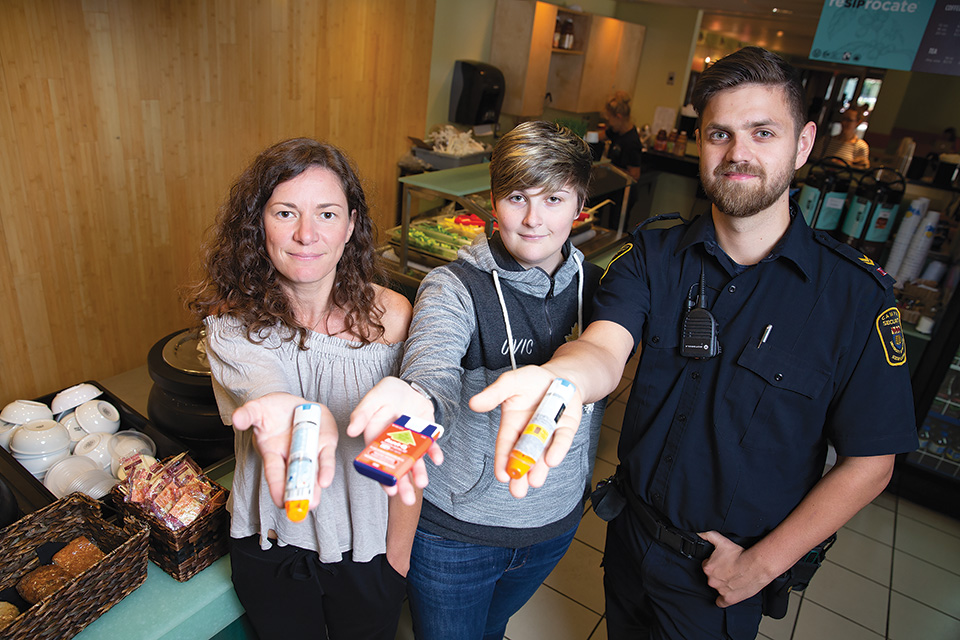Campus food allergy program a collaborative effort to reduce risk

Kylie Lauzon knows the fear of food allergies. The third-year UVic English student has an arm’s length list of ingredients—running from soup to nuts to carrots and sunflower seeds—that she can’t eat without triggering an anaphylactic reaction, constricting sore throat, or severe itching.
“I have an abusive relationship with food,” she says. “I love it so much, but it hurts me. I thought it was normal to be in pain when you eat.” Lauzon has suffered severe reactions after unknowingly ingesting food allergens and carries an Auvi-Q auto-injector device. Similar to the more common EpiPen, it delivers epinephrine to counter the allergic attack. Untreated, anaphylaxis can become fatal within minutes due to respiratory distress and a catastrophic drop in blood pressure.
As not everyone with severe food allergies always carries an epinephrine device, UVic Food Services, Student Health and Campus Security Services have collaborated to provide stock-epinephrine—to save lives in the event that someone suffers a reaction and isn’t carrying medication. UVic Food Services dietitians Nicole Fetterly and Leanne Halligey initiated the “stock epi” program.
“EpiPens get forgotten, they expire yearly and someone may have never experienced this severe a reaction prior, so many not know they need to carry an EpiPen,” says Fetterly. “Stock epinephrine is then the best practice to save a life in the event someone doesn’t have their own EpiPen or they possibly need a second dose.”
Campus Security Services responds to more than 400 medical emergency calls every year.
So Student Health Services got involved in training security officers as first responders in using epinephrine. There have been numerous incidents of anaphylaxis on campus in the past and it’s estimated that as much as seven per cent of the population suffers from severe food allergies, says Fetterly. If someone suffers an allergic reaction, responders can now quickly administer a dose of epinephrine.
Our department is proud to be part of this initiative. By having the ability and more importantly, the accessibility to administer epinephrine, Campus Security will be better equipped to serve the university community for these types of emergencies.
—Tom Downie, director of Campus Security Services
There has never been an allergy-related fatality at UVic, but a Queen’s student died in 2015 as the result of a severe allergic reaction and a lack of epinephrine to treat it quickly.
“It’s a comfort to me to know there’s an EpiPen around,” says Lauzon.
“Stock-epinephrine is becoming more common in community centres, shopping malls, schools, summer camps, ski resorts and other public places across the country,” says Fetterly. “UVic will be a leader in taking steps to treat this potentially fatal reaction and save lives on campus.”
UVic is already a leader in raising awareness about food allergens. Fetterly and Halligey initiated a project last year for labelling of allergens for menu items at University Food Services and counselling students on navigating their allergies safely.
Lauzon provided advice from her personal experiences, assisting with the food-ingredient labelling program and is pleased to see allergy binders at many campus food venues.
“Food Services on campus has become more transparent. I have become a more educated person about food allergies. I can affect some change,” says Lauzon, who hopes to create an allergy support group on campus.

